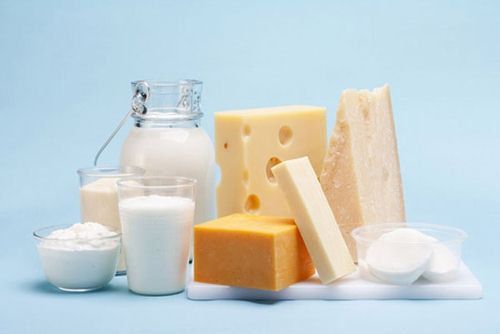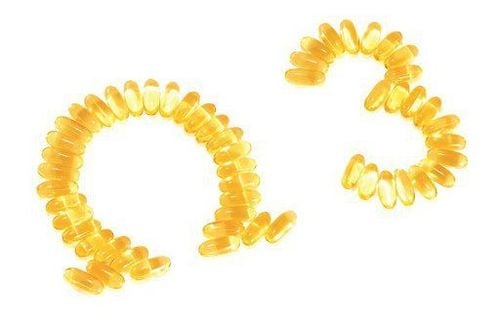This is an automatically translated article.
Fat is an important part of everyone's diet. So how much fat should you eat per day? This article will evaluate different types of fat and give suggestions on how much fat you should consume each day.
1. What is fat?
Along with protein and carbs, fats play a very important role in everyone's diet. You consume fat in the form of Triglycerides (triglycerides). A triglyceride molecule consists of 3 fatty acids attached to glycerol. Fatty acids contain carbon and hydrogen chains.
Classification of fats by carbon chain length:
Short chain fatty acids: Less than 6 carbons; Medium-chain fatty acids: 6 - 12 carbons; Long-chain fatty acids: 13 - 21 carbons; Very Long Chain Fatty Acids: More than 22 carbons. Most of the fats that humans consume are long-chain fatty acids. Short-chain fatty acids are mainly produced when bacteria ferment soluble fiber in the colon. The fat found in milk also contains trace amounts of short-chain fatty acids.
Long chain and very long chain fats are absorbed into the bloodstream, released into the body's cells as needed. The liver takes up short and medium chain fats directly and stores them as energy.

Chất béo đóng vai trò quan trọng đối với sức khỏe
2. The function and benefits of fat
Fats perform a number of functions and provide a number of health benefits such as:
Energy: Fat is considered an excellent source of energy. 1g of fat provides 9 calories, while 1g of protein or carbs provides only 4g of calories; Regulating hormones and genes: Fat regulates the production of reproductive hormones, steroids and genes related to growth and metabolism in the body; Brain function: Getting enough fat is important for brain health, including improved mood; Absorption of fat-soluble vitamins: Vitamins A, D, E and K must be consumed with fat for best absorption by the body; Flavor food and satiety: Adding fat to foods makes them taste better and makes you feel fuller for longer. Fat in the body also helps:
Insulate the system of organs in the body; Keep the body warm; Reserve, provide energy in case the body lacks calories.
3. Types of Fats
Fatty acids are grouped based on the number of double bonds between the atoms in their structure. Specifically:
3.1 Monounsaturated fats
Monounsaturated fatty acids (MUFAs) have 1 double bond in their carbon chain. Foods containing monounsaturated acids are usually liquid at room temperature, which is well suited for cooking purposes. The most common monounsaturated fatty acid is oleic acid, which is abundant in olive oil.
Monounsaturated fats have many health benefits, including reducing the risk of serious diseases like cardiovascular disease and diabetes. A diet rich in monounsaturated fats has lower blood sugar, triglycerides, weight, and blood pressure than a high-carb diet. In addition, a diet high in monounsaturated fats also increases levels of HDL cholesterol (the good cholesterol). At the same time, this type of fat also increases the feeling of fullness, which leads to a decrease in the number of calories the body consumes.
3.2 Polyunsaturated fats
Polyunsaturated fatty acids (PUFAs) contain 2 or more double bonds. It can be divided into groups, depending on the location of the double bond, including Omega-3 and Omega-6. The double bonds make polyunsaturated fatty acids more flexible and liquid than saturated fats. However, it is also more susceptible to spoilage and rancidity.
Studies have found that long-chain Omega-3 fats are beneficial for people with inflammation, cardiovascular disease, diabetes, depression and other health conditions. Although the body needs Omega-6 fats, consuming too much can cause chronic inflammation, especially when Omega-3 intake is low.

Chất béo không bão hòa đa có chứa Omega-3 và Omega-6
3.3 Saturated fat
Saturated fatty acids (SFAs) do not contain double bonds in their carbon chains. So, carbons saturated with hydrogen, which are stable at high temperatures, are less prone to spoilage during cooking (when compared to polyunsaturated fats).
Consuming saturated fatty acids can increase levels of LDL cholesterol (bad cholesterol) and also raise HDL cholesterol (good cholesterol). Overall, studies show that consuming saturated fat may not have any health effects. In fact, certain foods high in saturated fat can benefit your metabolism.
The American Heart Association recommends: If you eat about 2,000 calories / day, you should consume about 13g of saturated fat / day.
3.4 Trans fats (trans fats)
In trans fat molecules, the hydrogens are lined up opposite each other instead of next to each other. Small amounts of trans fats occur naturally in dairy and animal foods. However, trans fats in processed foods are not of natural origin. These trans fats are created by adding hydrogen to unsaturated fats, forming a product that functions like saturated fat.
Consumption of trans fats can lead to a number of health problems. Trans fats have been linked to inflammation, increased unhealthy cholesterol, impaired arterial function, insulin resistance and the formation of belly fat, increasing the risk of cardiovascular disease.
Trans fats are commonly found in margarine and processed foods. Food manufacturers sometimes add them to packaged products like cookies to extend shelf life.
4. How much fat to eat each day for good health?
Calorie requirements for weight loss or weight maintenance will determine the amount of fat you consume. In addition, how much fat should be eaten each day also depends on your diet. You can determine your calorie needs for weight loss or weight maintenance to calculate your appropriate fat needs.
4.1 Low-fat diet
A standard low-fat diet should contain no more than 30% of calories from fat. The recommended daily fat ranges for a low-fat diet based on calorie goals are as follows:
1,500 calories: Approximately 50g fat/day; 2,000 calories: About 67g fat/day; 2,500 calories: About 83g fat/day. Studies show that a higher-fat diet, such as the low-carb diet and the Mediterranean diet, offers many health benefits. And they may be a better choice than a low-fat diet.
4.2 High-fat, low-carb or Ketogenic diet
Ketogenic diet includes: Minimize carbs, provide a moderate amount of protein and include lots of fat. The percentage of fat will depend on how much you eat, but in general it should be about 75% of the calories. The following is the recommended daily fat range for a low-carb or Ketogenic calorie-targeted diet:
1,500 calories: Approximately 83 - 125g fat/day; 2,000 calories: About 111 - 167g fat/day; 2,500 calories: About 139-208g fat/day.

Nhu cầu chất béo trong chế độ ăn keto
4.3 Mediterranean diet with fat
The Mediterranean diet includes a wide variety of plant and animal foods such as: Fish, meat, eggs, milk and dairy products, extra virgin olive oil, fruits, vegetables, legumes and cereals. It usually provides about 35-40% of calories from fat, including plenty of monounsaturated fat from olive oil. Recommended daily fat range for the Mediterranean diet based on calorie goals:
1,500 calories: Approximately 58 – 67g fat/day; 2,000 calories: About 78-89g fat/day; 2,500 calories: About 97 – 111g fat/day.
5. Foods rich in healthy fats
No matter what kind of diet you follow, it's important to have a balance of different types of healthy fats. Many foods can provide the necessary fats for the body. Specifically:
Monounsaturated fats: Present in most foods of plant and animal origin. In it, some foods are very rich in this fat, which is olive oil, macadamia nuts, almonds, pecans, hazelnuts, pistachios, peanuts (peanuts), avocado, beef, pork. All of these foods also contain Omega-6 polyunsaturated fats; Polyunsaturated fats: Omega-6s are found in most plant and animal foods, including those mentioned above. Besides, you need to add foods rich in Omega-3 fatty acids found in salmon, sardines, herring, mackerel, anchovies, flaxseeds, chia seeds, walnuts. Flaxseed or certain plant foods contain alpha-linolenic acid (ALA). It can convert into eicosapentaenoic acid (EPA) and docosahexaenoic acid (DHA), which is beneficial to health; Saturated fat: Healthy foods that contain a lot of saturated fat include coconut oil, palm oil, whole milk, cheese, lamb,... Fat performs many important functions for the body. make food more delicious. Eating the right amount and type of fat will help you reduce your risk of disease and improve your overall health.
Please dial HOTLINE for more information or register for an appointment HERE. Download MyVinmec app to make appointments faster and to manage your bookings easily.
Reference source: healthline.com













